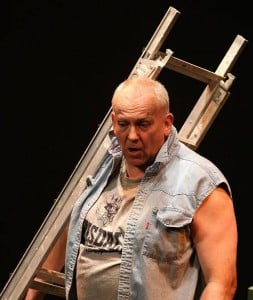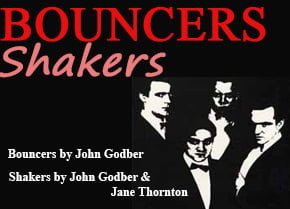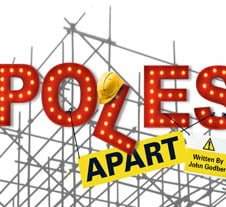Interview: Playwright John Godber
November 3, 2015

It’s heartening to know that the UK’s third-most performed playwright is a true Yorkshire man. Born near Pontefract and an ex-student of the Leeds University, John Godber is a playwright with his finger on the pulse of British culture. As those who live in the ‘grim North’ know, Yorkshire is a cultural hub, but it hasn’t always been that way and much of the theatre scene in the North is down to the efforts of John Godber.
During his time as the Artistic Director of Hull Truck Theatre Company, Godber inspired a new wave of theatre audiences and his seminal plays continue to be performed worldwide, such as Bouncers, Teechers and Up ‘n’ Under. His work is an essential part of the UK drama curriculum and, as a TSOTA affiliate, a Hull-based drama teacher states, “John Godber is what gets kids into acting”. With over 60 plays under his belt, John Godber is a man who knows about theatre.

Photo credit: Amy Charles Media
TSOTA: Bouncers has been around for over thirty years and is still endlessly popular. Why do you think the play has had such a long life on stage?
JG: I guess because it’s the truth. My daughter is now doing what I did thirty years ago, going out, getting drunk and rolling in at quarter to four. I don’t like it, but I can’t complain, because I did it myself. The music may have changed, but clubbing is clubbing. Bouncers is currently on in Liverpool and they’ve Scouse-ified it – it starts being about the Liverpool experience. My agent once came to Wakefield to see it and, when he came out of the theatre, it was like Benidorm but with police on horses and he said “I didn’t realise it was true”. We are an island nation and we like a drink and I guess that’s why the play’s still around.
TSOTA: What was the first performance of Bouncers like and how was it received?
JG: The first performance was in Edinburgh in 1977 to an audience of two people. One was a drunk and the other was a critic from The Scotsman. Bouncers was a two-hander at the time, before I wrote it for four actors, and I was in the first performance. The drunk came on stage and started talking to us, so the critic left. We wanted to be artists and actors, so we went to Edinburgh for four days, but it turned out to be a complete waste of time.

Image courtesy of josef-weinberger.com
TSOTA: Many people still view theatre as an elitist activity. How do you think attitudes towards theatre have changed since you first started writing?
JG: I think they’ve hardened in both extremes. You can’t talk about the arts without talking about government policy and, for me, without talking about the importance of drama in the curriculum. I was very lucky – I went to a school where everybody did drama – but nowadays drama is marginalised on the curriculum. If you look at the way arts funding works, with £84 per head in London compared to £4.70 in the regions, there is still a battle to be fought for the arts. I think there is still a pocket, generally white working-class men, for whom theatre-going is a complete anathema. You and I have seen how plays transmogrify people’s lives, but there is still a disconnect for a lot of people. Alan Ayckbourn said to me once that the most difficult people to get into theatre are white working-class men, because they assume they’ll be made to feel stupid. I was a student at Leeds for eight years and my doctoral research was in quite an esoteric subject matter. If I’d written about that, I don’t think I’d have had the same kind of penetration into getting people who perhaps don’t go to the theatre to go to the theatre.
TSOTA: How do you feel about students studying your plays in school as opposed to discovering them at the theatre?
JG: Because my plays are performed a lot, they’re misunderstood quite a lot and I think, with Bouncers and Teechers, people tend to play it for the comedy and actually they’re only funny because they’re true. If you miss the truth and the acuteness of the observation, you miss the political point. In terms of Bouncers, it’s “Is this how we best spend our nights?” and, in terms of Teechers, it’s that difficult kids need great teachers. Unfortunately the system is designed in a way that difficult kids don’t get the great teachers, because the great teachers become department heads or get out of the teaching system. So all those plays start in serious places.
TSOTA: What can you tell me about your latest play, Poles Apart?
JG: Poles Apart was commissioned by David Pugh, the man behind The Full Monty and Calendar Girls. He’d had an interesting experience in his office in London with some scaffolders working outside. There was this communal suspicion between the scaffolders and the people working in the theatre and that culture clash is what the play investigates. It’s something I’ve been interested in for a long time. Physical labour desensitises us and I’m fascinated by the hollowness of the macho working-man image.

Image courtesy of hulltruck.co.uk
TSOTA: Is it true that you were originally cast as Mark Addy’s character in The Full Monty?
JG: That’s true. I was coming home from my mum’s one Sunday and got a phone call asking me to audition for The Full Monty. I went down, did a screen test and got offered the part of Dave, but the very same day I was told we’d got the money to make Up ‘n’ Under into a feature film. I’d waited eleven years to get the money, so I told Peter Cattaneo (Director of The Fully Monty) that I couldn’t do it. He said “Can you recommend anybody?” and I said “What about Mark Addy?” He’d never heard of him, so I gave him Mark’s mobile number and the rest is history. We were very proud of Up ‘n’ Under. It came out on the back of The Full Monty and I think for that reason it didn’t get the critical or worldwide acclaim. It did very well for a low-budget movie, but we were first-time producers and that’s a very steep learning curve.
TSOTA: What are the different disciplines in writing for film and for theatre?
JG: Personally, I find writing for the theatre much more freeing. It’s more organic and there’s much more life in it. I’ve written a lot for television – Brookside, Grange Hill – but it doesn’t feel like my perfect hunting ground. There’s something very restrictive about writing for film and it diminishes your imagination. Having said that, I recently watched Bronson, which was amazing. It’s a very theatrical movie and Tom Hardy is astonishing.
TSOTA: You utilise multiple role-play in your work, with actors often playing multiple characters. Where did that format originate for you?
JG: Mostly it was just very practical. With Bouncers, I wanted to show every angle of an evening. It became a way to make telling any story possible and the acting in the middle of it is almost a dance. There’s also a sense of stand-up comedy about it. When I was running Hull Truck, multiple role-play became central to everything we did, because we had to think about costs. Being an ex-drama teacher meant I was used to not having many resources and the main resource I had was the imagination of the audience and the imagination of the actors. Someone told me recently that Bouncers is similar to what Michael McIntyre is doing: narrative-based stand-up comedy, but with four Michael McIntyres.

Image courtesy of hulltruck.co.uk
TSOTA: After 26 years at the helm of theatre company Hull Truck, you left in 2010. What was it like leaving?
JG: I spent much of my life building up that company. Hull Truck was bankrupt when I went there, so I had two options. I could either do popular plays or more esoteric plays and I chose to do popular plays. We were trying to de-mystify what theatre-going was for the local audience. We built the new theatre and raised a lot of money – 15 million pounds – but when the board made Gareth Tudor Price (Hull Truck’s former Artistic Director) redundant, I couldn’t stay related to the company. Theatres need Artistic Directors, not just Chief Executives. My dad was a member of the NUM (National Union of Mineworkers) and I’ve supported Labour all my life, so I guess I’m on the left and that’s why I left Hull Truck. It was definitely a bereavement and a very difficult thing to do.
TSOTA: Do you read reviews of your shows?
JG: I’ve done this for a long time and I can’t help it if people don’t like what I’m doing. You can’t take reviews too seriously because they only saw one night. The great thing about being a writer/director is that you get to change the show on a daily basis. With a new play, you’re continually monitoring the audience’s response to it. Bouncers has been around for thirty-odd years, so it’s got the benefit of being tried and tested. I think the theatricality of Bouncers is also the energy of it. I couldn’t write it now, because I wrote it when I knew nothing about writing plays. The processes of writing sometimes take you away from the urgency and energy of writing. That’s part of the reason Bouncers has done so well – and it’s funny.
Poles Apart is currently on tour and will be appearing at the Hull Truck Theatre from the 3rd to 14th November.
You can follow Joe Saxon at @JoeSaxonWrites.
Filed under: Theatre & Dance
Tagged with: Hull Truck Theatre, interview, John Godber, Poles Apart, theatre



Comments